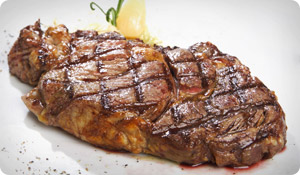
In the study, lead author John Witte, PhD, professor at UCSF medical school and his colleagues compared about 500 men who recently had been diagnosed with aggressive prostate cancer to a cancer-free group.
"Each participant filled out detailed questionnaires about their diets over the previous year, including the amount of meat they ate and how it was prepared," Witte wrote in an email. "Men who ate the most ground beef were 2.3 times more likely than men who ate none to have aggressive prostate cancer."
Higher consumption of fatty lunchmeats (such as salami) and liver was also associated with an increase in cancer risk. Poultry, bacon, and low-fat hot dogs and sausages appeared to have little influence on cancer risk. No link was found between consumption of rare- or medium-cooked ground beef and aggressive prostate cancer.
The narrowness of the study is what makes it significant, says the author. "A key aspect is the focus on more advanced prostate cancer. This is clinically important," explains Witte. "As far as preparation of the meat is concerned, using alternative methods of cooking is an easily modifiable behavior."
The authors examined meat consumption that was not only grilled/barbequed but pan-fried, microwaved, and boiled. Only meats that were grilled/barbequed showed an association with prostate cancer.
The association was even stronger when looking at men with advanced prostate cancer. Those men had a 36 percent higher risk of advanced prostate cancer in the highest quintile of meat consumption compared to the lowest.
According to the National Cancer Institute, evidence suggests potential carcinogens are produced by cooking meat at high temperatures since the process causes the production of carcinogenic heterocyclic amines (HCAs) and polycyclic aromatic hydrocarbons (PAHs). HCAs and PAHs are chemicals formed when muscle meats—including beef, pork, fish, or poultry—are cooked using high-temperature (over 300 degrees Fahrenheit) methods such as pan frying and grilling directly over an open flame.
HCAs and PAHS have been found to be mutagenic—that is, they cause changes in the DNA that may increase the risk of cancer. HCAs are formed when amino acids (the building blocks of protein), sugars, and creatine (a substance found in muscle) react at high temperatures. When meat is cooked on an open flame, fat and juices drip into the fire. The process produces PAHs which coat the meat when flames hit it. People can also be exposed to PAHs from environmental sources such as pollution and tobacco smoke.
What You Can Do
Prostate cancer is the most common, non-skin cancer and the second most common cause of cancer-related death in men in the United States. Prostate cancer can range in severity from benign tumors that require no treatment to very aggressive forms that are usually deadly. Age, family history, and genetics are risk factors (Caucasian men have a lifetime risk of 17.6 percent of developing prostate cancer; African American men have a 20.6 percent risk). The evidence for environmental risk factors—including diet—is less clear, though researchers have long suspected they play a role.
Although there are no specific guidelines regarding HCA/PAH consumption, here are some ways you can reduce your exposure:
- Grill less often.
- Use a microwave to cook meat prior to grilling as it will lessen total cooking time over the flame and thereby reduce HCA formation.
- Continually turn meat when over a high heat source as opposed to leaving it for long periods.
- Refrain from eating charred portions of meat or any gravy made from meat drippings.
Witte hopes the recent findings will help determine which potential cancer-causing compounds should be targeted for prostate cancer prevention strategies. "Although certain mutagenic compounds, may play a role, other molecules may also be involved," writes Witte in the research study summary published in the journal PLoS One. "Further studies are necessary to better characterize the potential role of these compounds in prostate carcinogenesis and to evaluate whether these compounds will respond to chemoprevention of prostate cancer."
In the meantime, Witte recommends eating less red meat. "Don't char your burgers and consume in moderation."
Sources:
National Cancer Institute
http://www.cancer.gov
University of California San Francisco
http://www.ucsf.edu
Email interview with John Witte, UCSF
Lead Study Author





